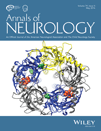Neuroscientists have retracted a research letter less than two months after it appeared, admitting they appeared to pass off others’ data as their own.
Two of the researchers are listed as affiliated with the University of California, San Francisco (UCSF), and the incident has led to a misconduct investigation at the institution, a UCSF spokesperson told us.
The article, “DNAJC6 variants in Parkinson’s disease and amyotrophic lateral sclerosis,” appeared in April. It was quickly followed by this notice, dated in May:
The above Letter to the Editor from Annals of Neurology, published online as an Accepted Article on 4th April 2016 on Wiley Online Library (wileyonlinelibrary.com), has been withdrawn at the request of the authors with agreement from the journal editor, Clifford B. Saper, and Wiley Periodicals, Inc. The withdrawal has been agreed due to an acknowledgement from the authors that they inappropriately implied that material from the PD Gene and ALS Gene public databases and a figure from the Max Planck Society for the Advancement of Science was their own work.
The article has not yet been indexed by Thomson Reuters Web of Science.
Saper told us that someone representing the source of the purloined data contacted the publication shortly after it appeared online:
An author of the website from which the data had been taken wrote to us to inform us of this event, a few days after the accepted manuscript went on line, and before it had been assigned to an issue. We checked and found that this was indeed the case, and informed the authors and their institution about this. The authors retracted their paper.
We had one other manuscript from these same authors which we were still evaluating, and we rejected that as well. This group appears to have over 45 papers in PubMed in 2016 alone that use similar methods (i.e., database mining, which can be legitimate if done properly, but which can be misconduct if the gene association is already present and identified in the database, and the authors of the new article claim that they discovered it). I have not investigated any of their other papers, but did point this out to the author’s institution.
The first and last authors on the paper, Jintai Yu and Teng Jiang, are listed as affiliated with UCSF. According to this bio sketch from the Annals of Translational Medicine:
Dr. Yu has been PIs of several grants funded by National Natural Science Foundation of China. He is currently also involving in several NIH sponsored large cohort consortiumsin Dr. Boxer’s lab in the field of Tauopathies and Frontotemporal Lober Degeneration in UCSF, such as the “Four Repeat Tauopathy Neuroimaging Initiative (4RTNI)”, and the “The Frontotemporal Lobar Degeneration Clinical Research Consortium (FLDCRC)”.
Dr. Jintai Yu is currently the senior editor of Journal of Alzheimer’s Disease, editor of American Journal of Neurodegenerative Disease, Molecular & Cellular Epilepsy, et al., and is the author of more than 150 peer review publications in the main scientific journals including: Annu Rev Neurosci, Trends Mol Med, Alzheimers Dement, Neuropsychopharmacology, J Neurol Neurosurg Psychiatry, Neurobiol Aging, Mol Neurobiol, Neuropharmacology, Br J Pharmacol, J Alzheimers Dis, et al.
Yu did not respond to a request for comment.
Kristen Bole, a spokeswoman for UCSF, says the school is looking into the matter:
UCSF is investigating this through our Research Misconduct Investigations Unit. We do not have any findings at the current time.
Like Retraction Watch? Consider making a tax-deductible contribution to support our growth. You can also follow us on Twitter, like us on Facebook, add us to your RSS reader, sign up on our homepage for an email every time there’s a new post, or subscribe to our new daily digest. Click here to review our Comments Policy. For a sneak peek at what we’re working on, click here.
